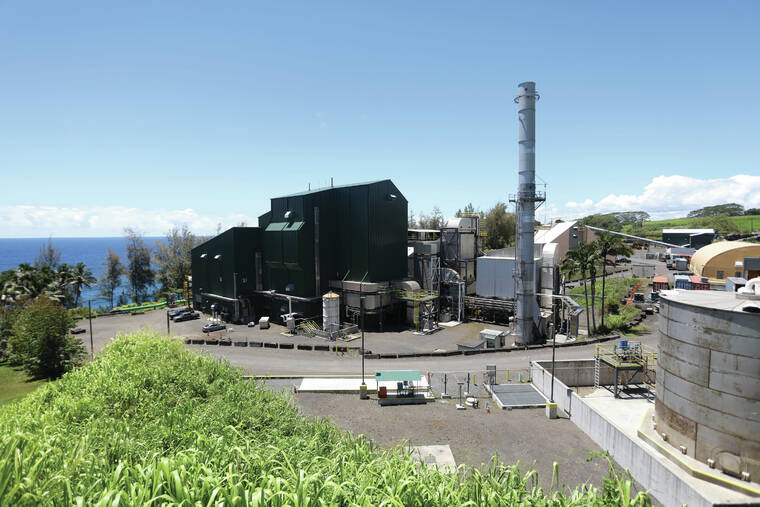Honua Ola Bioenergy is seeking more than $1 billion in damages from Hawaiian Electric Industries Inc., claiming in federal court that the electric utility has used monopolistic measures to keep Honua Ola’s completed but idle biomass power plant from going online.
Honua Ola, also known as Hu Honua Bioenergy, filed a motion Thursday in U.S. District Court in Honolulu asking that its 2016 civil suit against Hawaiian Electric be reopened to consider antitrust claims Honua Ola says it has discovered since the lawsuit was originally filed.
A tentative settlement of that suit was reached in 2017, and the litigation was closed by the court in 2019.
“(Honua Ola’s) newly constructed facility would bring reliable, renewable energy to Hawaii Island at a competitive price, but sits idle today solely due to Hawaiian Electric’s predatory and anti-competitive conduct, which it has ruthlessly wielded to entrench and expand its monopoly over Hawaii’s power sector,” said Daniel G. Swanson, a Los Angeles attorney representing Honua Ola.
In March, the state Supreme Court voted 5-0 to reject Honua Ola’s appeal of the Public Utilities Commission’s denial of the company’s power purchase agreement with Hawaiian Electric. The high court concurred with the PUC that the high cost of electricity and greenhouse gas emissions from the wood-burning power plant weren’t in the public interest.
The 21.5-megawatt plant in Pepeekeo was financed by a group of wealthy mainland investors led by Jennifer Johnson, president and CEO of Franklin Resources — parent company of Franklin Templeton Investments — an American multinational holding company with a reported $1.53 trillion in assets.
Honua Ola estimated that over the 30-year term of an energy contract with Hawaiian Electric, its electricity would be supplied at an average of 22 cents per kilowatt hour. That’s considerably higher than estimates of recently approved solar contracts, with projected costs of 8 to 9 cents per kilowatt hour.
Honua Ola’s allegations include that Hawaiian Electric has engaged in a “straw purchase” scheme to acquire and conceal a controlling interest in the 60-megawatt Hamakua Energy power plant after state regulators had denied Hawaiian Electric’s previous bid to acquire Hamakua.
The complaint alleges Hawaiian Electric has a near-total monopoly over the wholesale firm power generation market on the Big Island and is the only purchaser of that power.
Claims in the lawsuit include that Hawaiian Electric has cornered more than 90% of and, at times, almost all firm power generation capacity on the island, while ratepayers — who pay the costliest electric bills in the U.S. — have seen price hikes of 50% to 100% or more, with slimmer energy reserves and a higher risk of power outages.
The motion states that at least nine times times between August 2022 and March 2023 Hawaiian Electric asked customers to reduce power consumption during peak hours. In March, Big Islanders experienced rolling blackouts initiated by Hawaiian Electric.
Honua Ola blames Hawaiian Electric’s high electric rates on imported petroleum products and aging power generation facilities, accusing the utility of acting “with shameless arrogance and disregard not just for competition, but for the people, economy and environment of Hawaii Island.”
As of Friday afternoon, no hearing had been set regarding Honua Ola’s request to reopen the lawsuit.
The Tribune-Herald reached out Friday to Hawaiian Electric spokesman Darren Pai, who declined to comment.
Email John Burnett at jburnett@hawaiitribune-herald.com.



